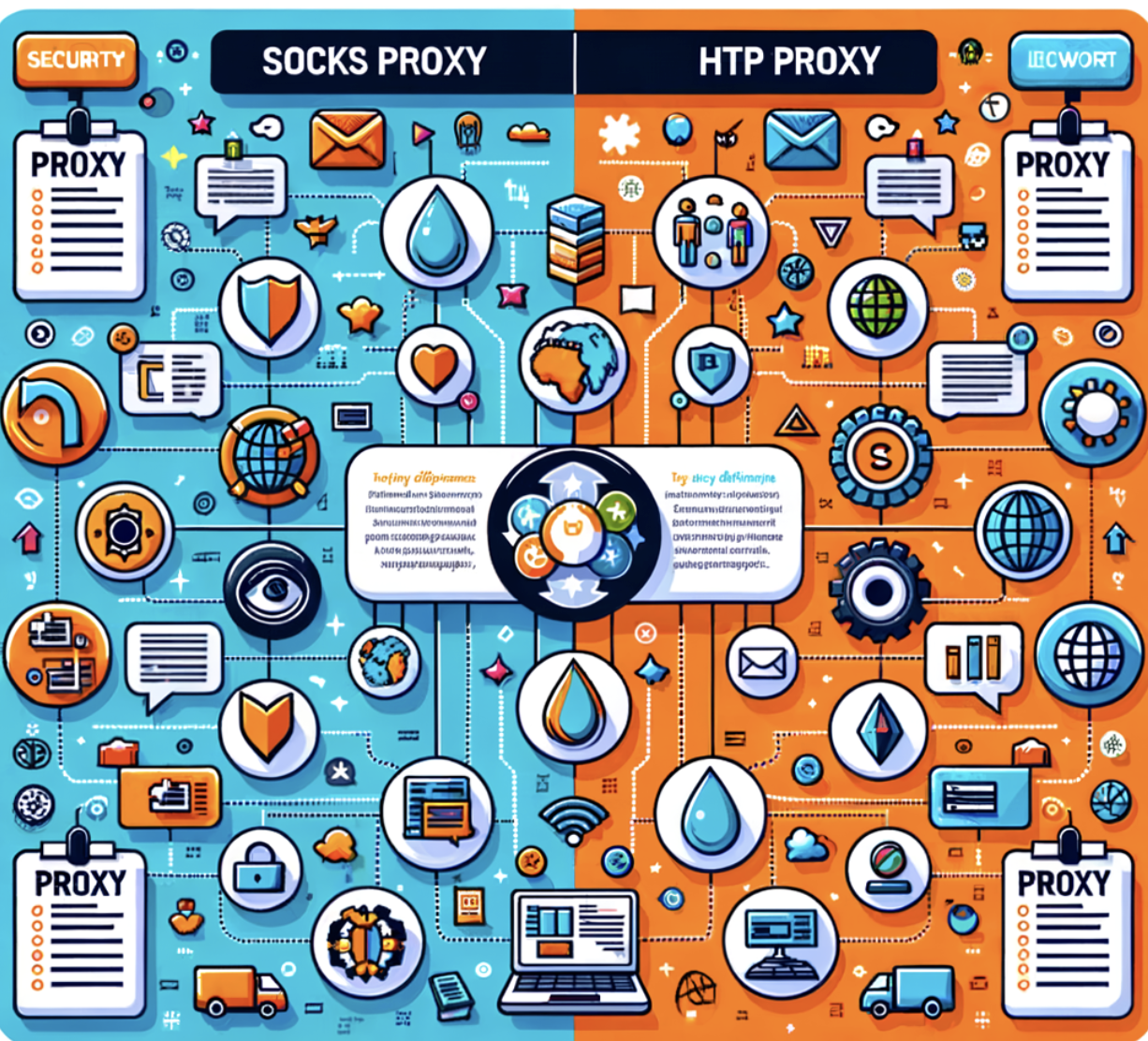Ever wondered about the difference between SOCKS proxies and HTTP proxies? If you’ve spent some time searching for ways to boost online privacy, scrape data, or manage multiple accounts securely, you’ve probably seen these terms everywhere. But what makes them different?
What Are Proxies?
At their core, proxies act as middlemen between your device and the internet. They reroute your traffic through different IP addresses, helping with privacy, bypassing restrictions, and managing requests efficiently.
Quick Proxy Definition
- A proxy is a server that relays web requests for you. Instead of asking a website for info directly, your request travels through the proxy first.
- Websites see the proxy’s IP, not yours.
Proxy Types and Features:
🏘️ Rotating Residential Proxies
What Is an HTTP Proxy?
An HTTP proxy is designed to handle requests specifically for web traffic. It understands browser requests (HTTP and HTTPS), making it perfect for surfing, scraping websites, and managing web apps.
Key Features
- Works with browser traffic and web APIs
- Understands web languages (HTTP, HTTPS)
- Can filter or modify web traffic
- Good for scraping, price monitoring, ad verification, and content access
- Only works for HTTP/HTTPS protocols
What Is a SOCKS Proxy?
A SOCKS proxy is more flexible. It operates on a lower level, meaning it can handle any kind of traffic, not just web pages.
Key Features
- Handles a variety of protocols (TCP, UDP)
- Doesn’t interpret or modify traffic
- Works for emails, torrents, FTP, gaming, social media apps, and more
- Often used when handling tons of different data types or non-web traffic
SOCKS vs HTTP Proxy: Major Differences
Here’s a handy data table that shows how SOCKS and HTTP proxies stack up :
| Feature | SOCKS Proxy | HTTP Proxy |
| Supported Protocols | TCP, UDP | HTTP, HTTPS |
| Data Type | Any (web, FTP, email, etc.) | Web traffic only |
| Speed | Slightly slower (extra steps) | Faster for web requests |
| Security/Encryption | Depends on the version | Supports HTTPS encryption |
| Traffic Filtering | No | Yes |
| Use Cases | Data scraping, torrenting, gaming, FTP | Web scraping, ad verification, and price monitoring |
| Anonymity/Privacy | Excellent (no interpretation) | Good, but may leak info |
| Compatibility | Wide (many apps) | Browsers, web crawlers |
Discover our best premium proxies – ProxyEmpire
Performance and Speed
Speed is vital, especially when scraping large amounts of data or streaming media.
HTTP Proxies
- Often slightly faster for web tasks
- Optimized for browser-like traffic
- Can cache content to improve load times
SOCKS Proxies
- Can be somewhat slower (because they process all traffic types)
- Less caching, sometimes more overhead
- But more versatile and reliable for non-web apps
Use Cases: Which Proxy Fits Your Needs?
Let’s look at where each type really shines.
Best Uses for HTTP Proxies
- Web scraping: Get bulk data from websites without getting blocked
- Ad verification: Check how ads display in different countries
- Content access: Unlock region-restricted streaming or information
- Review monitoring: Analyze user reviews in multiple regions
Find more about scraping and ad verification on our blog for detailed guides.
Best Uses for SOCKS Proxies
- Email automation: Manage multiple accounts without bans
- Torrenting and P2P sharing: Mask activity, reduce risk
- Gaming: Play in foreign servers, avoid lag or blocks
- FTP access: Transfer files securely from remote sources
- Social media automation: Run bots or campaigns without blocks
Discover our (use case):
Security: How Do They Protect Your Data?
Security matters, especially when handling sensitive transactions or scraping competitively.
HTTP Proxy Security
- Supports HTTPS encryption for secure web traffic
- Can filter and block malicious sites
- May leak some data (headers) if not set up carefully
SOCKS Proxy Security
- Does not filter or interpret traffic, lowering detection risk
- SOCKS5 adds authentication, allowing only authorized users
- Less risk of leaking sensitive headers or cookies
Technical Details: Protocol and Encryption
A technical breakdown helps clarify things.
SOCKS Protocols
- SOCKS4: Supports only TCP, no authentication
- SOCKS5: Handles TCP and UDP, offers authentication, supports IPv6
HTTP Proxies
- Serve only web requests
- Can force sites to load non-secure connections
- Do not transmit all information, making them less ideal for apps, gaming, or large transfer tasks
How to Choose the Right Proxy
Let’s summarize with a quick decision guide:
- If you mostly browse or scrape websites, focus on HTTP proxies.
- For wide-ranging automation, massive data transfers, or non-web apps, use SOCKS5 proxies.
- Want the best privacy, lowest bans, and access to geo-blocked content? Combine rotating residential proxies with SOCKS or HTTP, and manage traffic naturally.
How ProxyEmpire Stands Out
ProxyEmpire is a premium proxy service provider designed to empower web scraping, data collection, and unrestricted internet access through a vast network of ethically sourced residential, mobile, and datacenter proxies. Below is a detailed description based on the provided information:
Overview of ProxyEmpire
ProxyEmpire offers a comprehensive suite of proxy solutions tailored for individuals, businesses, and developers seeking reliable, high-performance tools for data gathering, privacy protection, and bypassing geo-restrictions. With over +30 million clean IP addresses spanning 170+ countries, ProxyEmpire provides unparalleled global coverage, ensuring users can access content at scale with a 99.9% uptime and lightning-fast response times (as low as 0.6 seconds).
Proxy Types and Features:
🏘️ Rotating Residential Proxies
Key Benefits
- Global Reach: Access to over +30 million IPs worldwide, covering every major region, with precise targeting options (country, city, state, ASN/ISP).
- High Reliability: A 99.86% uptime ensures uninterrupted service, supported by patented technology for enhanced speed and security.
- Ethical Sourcing: Proxies are responsibly harvested, ensuring quality and compliance.
- Versatile Use Cases: Supports web scraping, price monitoring, sneaker copping, SEO tracking, ad verification, and more.
- Integration-Friendly: Compatible with standard proxy protocols (HTTP, SOCKS5) and third-party tools like Multilogin, Dolphin Anty, Kameleo, Octobrowser, and Gologin.
- No Hidden Fees: Transparent pricing with all features included, starting at a $1.97 trial.
Use case:
Why Choose ProxyEmpire?
- Massive Proxy Pool: Over +30 million IPs, outpacing competitors with broader coverage and quality.
- Superior Performance: High success rates (up to 99.95% for scraping) and industry-leading speeds.
- User-Friendly: Intuitive dashboard, developer-friendly documentation, and 24/7 support with dedicated account managers for corporate clients.
- Cost-Effective: Flexible pricing with no limits on concurrent sessions and a rollover data feature unique to ProxyEmpire.
FAQ:
1. What is the main difference between SOCKS and HTTP proxies?
The key difference lies in their protocol layer. SOCKS proxies operate at a lower level (the transport layer), forwarding all kinds of traffic such as HTTP, HTTPS, FTP, and even email or P2P. HTTP proxies, on the other hand, work at the application layer and are designed specifically for web traffic (HTTP/HTTPS).
2. Which proxy type offers better anonymity, SOCKS or HTTP?
Generally, SOCKS5 proxies offer stronger anonymity because they don’t modify data packets. They simply relay traffic, making it harder to detect or trace. HTTP proxies may add or remove headers for caching or filtering, which can sometimes expose information about your connection.
3. When should I use a SOCKS proxy instead of an HTTP proxy?
Choose a SOCKS proxy when you need flexibility and performance for non-web applications, for example, torrenting, gaming, VoIP, or secure data transfers. Use an HTTP proxy for tasks like web scraping, browsing, or managing SEO tools that rely on standard HTTP requests.
4. Is SOCKS5 faster than an HTTP proxy?
Yes, usually. SOCKS5 supports UDP and TCP connections, handles fewer data modifications, and allows for faster transmission speeds with less overhead. However, actual performance depends on the proxy server’s quality and network conditions.
5. Can I use SOCKS and HTTP proxies interchangeably?
Not always. HTTP proxies only handle web traffic, while SOCKS proxies can manage any type of internet traffic. Some software applications require a specific proxy type, so always check compatibility before switching.
6. Do SOCKS proxies support authentication?
Yes. SOCKS5 includes built-in authentication, allowing username and password protection. This makes it more secure for users who need controlled access. HTTP proxies also support authentication, but implementation varies by server configuration.
7. Which is better for web scraping, SOCKS or HTTP?
HTTP proxies are typically better for web scraping because they understand and interact with web requests directly, allowing for header manipulation, cookie handling, and browser emulation. However, SOCKS proxies can be used for scraping dynamic or mixed-protocol data sources.
8. Are SOCKS proxies encrypted?
No, SOCKS proxies themselves don’t encrypt traffic. However, when combined with an HTTPS connection, the data remains encrypted between the client and destination. For full encryption, consider using SOCKS5 with SSH tunneling or a VPN.
9. Is SOCKS5 safer than HTTP for online anonymity?
Yes. SOCKS5 offers better anonymity because it doesn’t interfere with or alter transmitted data. It’s ideal for privacy-focused users who want a clean relay between client and destination.
10. Which proxy should I choose for SEO or marketing tools?
For SEO, social media automation, or market research, an HTTP proxy (especially residential or datacenter type) is typically the best choice because these tools rely on web requests. For high-volume, multi-protocol tasks, SOCKS5 may be more stable.
11. Do browsers support SOCKS proxies natively?
Yes. Most browsers like Chrome, Firefox, and Edge support SOCKS5 proxy configuration, though you may need to adjust network settings or use extensions. Still, HTTP proxies remain more common for standard browsing setups.
12. What’s the best option for bypassing geo-restrictions?
Both can help, but SOCKS5 proxies are often more effective because they handle more types of connections and protocols, allowing access to apps, streaming, and websites blocked by location.




















